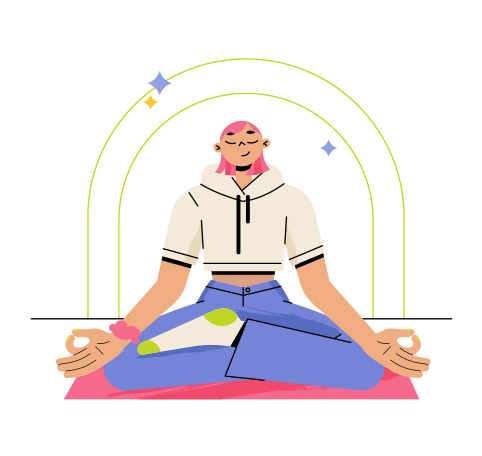🧡 Pre-Order now 🧡

As the saying goes, “Telling a mom not to worry is like telling water not to be wet.” As a mom, the things to be anxious about are neverending. Is my child eating enough? Is he eating too much? Are these sippy cups BPA-free? Is that behavior normal?
Even if you were on the laid-back side before becoming a mom, you might find your temperament changed now that you are responsible for a small human.
Wondering what’s normal anxiety and what is cause for concern? Maybe you are struggling with anxiety at night or mom guilt. You may even worry that your anxiety is making you a bad mom. Here we break down what you need to know about anxiety as a mom and 5 ways to cope with it.
Anxiety looks different for every individual, and that includes moms. However, here are some common signs and symptoms that moms with anxiety experience:
The average American parent worries about their child 2,153 times in the first year alone, an average of 6 times a day. But while worrying is normal for moms, if you find it difficult to control your worry or your worry is interfering with daily activities, you may have anxiety.
Do you often find yourself snapping at your partner or other family members? Anxiety can cause irritability, interfering with sleep and even relationships. Of course, night feedings can also interfere with sleep, so if you have a newborn, it might be difficult to determine whether your symptoms are caused by anxiety. However, if you find it hard to relax or sit still, if your insomnia is accompanied by racing thoughts, or if you feel constantly on edge, anxiety might be the culprit.
Anxiety can manifest in a variety of physical symptoms, such as headaches, gastrointestinal upset, heart palpitations, and muscle tension. If you’ve been medically cleared by your doctor but are still experiencing unexplained aches and pains, your symptoms may be caused by anxiety.
Because anxiety is an unpleasant sensation, moms with anxiety often avoid triggering situations or activities. For example, if you worry about losing your child in public, you may avoid going to crowded places. If you worry about germs, you may avoid playdates or public bathrooms.
As a mom, your primary responsibility is to keep your child safe. Sometimes, this can lead to overprotectiveness in the form of attempting to control every aspect of your child's life or shielding them from every challenge, risk, or failure. While well-intentioned, overprotective parents risk interfering with the development of autonomy and resilience.
Ever since women entered the workforce, moms have been told they can “have it all,” the expectation being that they excel both in their careers and as parents and homemakers. Social media has promulgated an even more unrealistic standard of motherhood with curated images of designer baby clothing, color-coded activity schedules, and Pinterest-worthy birthday cakes. Moms with anxiety, in particular, may feel pressure to be the “perfect” parent, criticizing perceived flaws or mistakes.
Anxiety puts the body into “fight or flight” mode, igniting activity in the brain’s emotional center and inactivating the regions responsible for focus, memory, and other executive functions. For this reason, moms with anxiety might have a hard time concentrating, be chronically forgetful, or tend towards procrastination.

Being a good mom is not about being perfect or free from mental health challenges. Rather, it is about being loving, supportive, and attentive to your children’s needs.
Of course, even the “best” moms are inattentive sometimes. Since this is more likely to occur when you are feeling anxious or overwhelmed, self-care is critical for moms with anxiety. Remember the adage to put on your own oxygen mask first, whether that means taking time for exercise, meditation, or time with friends.
Be honest with your children about your need to take care of yourself and your anxiety. In doing so, you are serving as a positive role model and giving them tacit permission to talk about their own mental health needs.
If these things aren't enough to manage your anxiety symptoms, consider seeking professional help in the form of a counselor or support group for moms with anxiety.


Anxiety is the most common mental health condition, with an estimated 45 million cases worldwide. Research indicates that moms may be at a higher risk for anxiety due to the unique stresses and demands of parenting. In 2019, 13.5 percent of mothers reported symptoms of moderate to severe anxiety. More recent research indicates that the number of moms with anxiety has increased since the COVID-19 pandemic.
Symptoms of anxiety can arise at all stages of the perinatal cycle: pregnancy, prenatal, and postpartum. While OBGYN’s and other health professionals regularly screen moms for depression, anxiety symptoms are sometimes overlooked. But moms should not feel ashamed or embarrassed about seeking help. Talking with a licensed professional or joining a support group can be extremely effective in managing symptoms of anxiety.
Just as our bodies have a built-in, "fight or flight" response that alerts us to potential dangers, we also have an innate "rest and digest" system that allows the body to relax and reset. You can trigger your own relaxation response with a variety of techniques, outlined below. You will find these strategies most effective if you take some time to practice them regularly when you are not feeling anxious.
For more tips on managing anxiety, see our post on harnessing anxiety here.

There is seemingly no end to the number of things to worry about as a parent. It's a tough job, and you are almost never "off-duty!" But while it's normal to worry about the health and well-being of your kids, when this worry starts to interfere with your own health and well-being, it's time for some self-care. Take some time out of each day to practice the strategies outlined above, or seek extra support in the way of professional counseling. You will be setting a positive example for your kids, and getting some much-needed respite for yourself!

Anxiety in a mom can present itself in various ways, and can be different for each individual. Some common signs of anxiety in a mom may include:
- Restlessness or feeling on edge
- Worrying excessively about the safety and well-being of children
- Difficulty sleeping or staying asleep
- Physical symptoms, such as muscle tension, headaches, or stomach problems
- Constantly checking on children and their activities
- Irritability or mood swings
- Avoiding certain situations that may trigger anxiety
- Difficulty concentrating or making decisions
- Panic attacks, which can include symptoms such as shortness of breath, racing heart, and sweating.
It's important to note that anxiety can manifest differently in different individuals, and it's essential for moms experiencing anxiety to seek help and support from healthcare professionals.
Yes, absolutely! Having anxiety does not prevent someone from being a good mom. Many moms with anxiety are excellent caregivers and provide a supportive and nurturing environment for their children.
However, it is important for moms with anxiety to take care of themselves and seek treatment if necessary to manage their symptoms. This can include therapy, medication, self-care practices, and support from loved ones.
It's also important to recognize that anxiety can be challenging, and it's okay to ask for help and support when needed. By taking care of their own mental health, moms with anxiety can continue to be loving and effective caregivers for their children.
Yes, mom anxiety is a real thing. Being a mom can be rewarding, but it can also be stressful, overwhelming, and anxiety-provoking. Moms may experience anxiety related to various things, such as their children's well-being, their own ability to parent, balancing work and family life, financial pressures, and more.
It's important to recognize that mom anxiety is a normal response to the challenges of parenting, but it can become problematic when it interferes with daily life or causes significant distress. Moms who experience persistent anxiety or feel overwhelmed by their anxiety should seek support from healthcare professionals. Therapy, medication, and self-care practices can help manage mom anxiety and improve well-being.
Anxiety is a common mental health condition that can affect anyone, including moms. According to the Anxiety and Depression Association of America, anxiety disorders are the most common mental illness in the United States, affecting about 40 million adults every year.
While there is no definitive data on the prevalence of anxiety in moms, research suggests moms may be at a higher risk of developing anxiety than the general population. A study published in the Journal of Affective Disorders found that mothers of young children were more likely to experience anxiety symptoms than fathers or childless women.
Overall, anxiety is a common experience among moms, and it's important for moms to seek support and treatment if they are struggling with anxiety symptoms.
